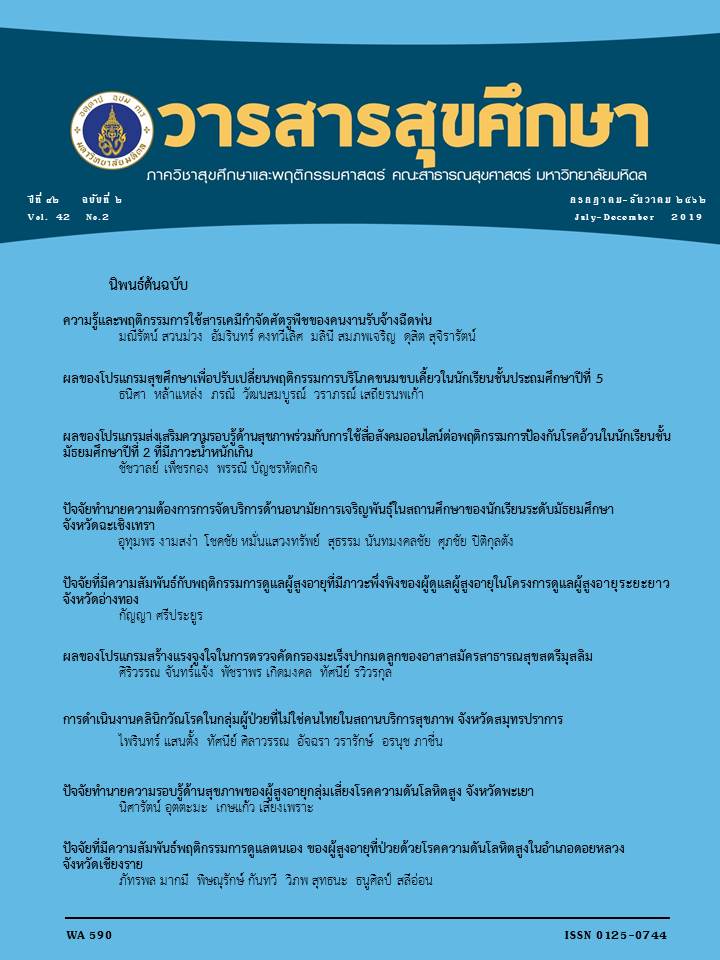ผลของโปรแกรมสร้างแรงจูงใจในการตรวจคัดกรองมะเร็งปากมดลูกของอาสาสมัครสาธารณสุขสตรีมุสลิม
คำสำคัญ:
การตรวจคัดกรองมะเร็งปากมดลูก, อาสาสมัครสาธารณสุข, สตรีมุสลิม, แรงจูงใจบทคัดย่อ
โรคมะเร็งปากมดลูกเป็นปัญหาสาธารณสุขที่สำคัญซึ่งมีแนวโน้มสูงขึ้น แต่อัตราการตรวจ คัดกรองมะเร็งปากมดลูกมีแนวโน้มลดลง โดยเฉพาะกลุ่มสตรีมุสลิม การศึกษาวิจัยกึ่งทดลองครั้งนี้มีวัตถุประสงค์เพื่อศึกษาผลของโปรแกรมสร้างแรงจูงใจในการตรวจคัดกรองมะเร็งปากมดลูกของอาสาสมัครสาธารณสุขสตรีมุสลิม กลุ่มตัวอย่างคือ อาสาสมัครสาธารณสุขสตรีมุสลิม จำนวน 64 คน โดยแบ่งกลุ่มทดลอง 32 คน และส่วนกลุ่มเปรียบเทียบ จำนวน 32 คน กลุ่มทดลองได้รับโปรแกรมสร้างแรงจูงใจในการตรวจคัดกรองมะเร็งปากมดลูก จำนวน 2 ครั้ง ร่วมกับการติดตามกระตุ้นเตือนทางโทรศัพท์ สำหรับกลุ่มเปรียบเทียบได้รับเอกสารแนะนำความรู้เกี่ยวกับโรคมะเร็งปากมดลูก เก็บรวบรวมข้อมูลด้วยแบบสอบถาม และวิเคราะห์ข้อมูลโดยใช้สถิติ Paired t-test และ Independent t-test
ผลการวิจัยพบว่า หลังการทดลอง กลุ่มทดลองมีจำนวนผู้มารับบริการตรวจคัดกรองมะเร็งปากมดลูกสูงกว่ากลุ่มเปรียบเทียบ ร้อยละ 93.8 มีคะแนนเฉลี่ยการรับรู้ความรุนแรงของโรคมะเร็งปากมดลูก การรับรู้โอกาสเสี่ยงของการเกิดโรคมะเร็งปากมดลูก และความคาดหวังในความสามารถของตนเองต่อการปฏิบัติตัวเพื่อป้องกันโรคมะเร็งปากมดลูกสูงกว่าก่อนการทดลองและสูงกว่ากลุ่มเปรียบเทียบอย่างมีนัยสำคัญทางสถิติ (p<0.001) จากการวิจัยในครั้งนี้ สามารถนำโปรแกรมสร้างแรงจูงใจในการตรวจคัดกรองมะเร็งปากมดลูกของอาสาสมัครสาธารณสุขสตรีมุสลิมไปประยุกต์ใช้ในการตรวจคัดกรองมะเร็งปากมดลูกของสตรีในชุมชนอื่นๆได้



